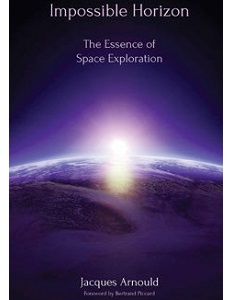The French space agency CNES doesn’t make a big deal of the fact that it has employed an ethics advisor for many years, but it’s nevertheless true. In addition to fulfilling that role, Jacques Arnould has written and edited a number of books on the ethics of space exploration and presented many papers at academic conferences.
This compact book is his latest epistle in a continuing drive to understand, as he implies in his title, ‘the essence of space exploration’ and to place it in the context of humanity’s life on Earth…and, of course, beyond. In introducing his thesis, he characterises humankind’s pre-space exploration status as “relegated to the centre, to a sort of ‘cesspit’ of imperfection, alteration, incompleteness and finally death” (which is as good a reason for a space programme as any!). He recognises the human need for a ‘horizon’ that hides what is beyond and galvanises people to try to explore that unknown and seemingly impossible realm.
In 15 short chapters, Arnould covers topics from ‘Tsiolkovski’s Dream’ to lunar exploration and asks questions such as “Space at all costs?” and “Does the ‘Envoy of Mankind” concept have a future?” To some, discussion of aspects apparently far-removed from rocketry and life-support systems may seem pointless, at the very least a distraction, but Arnould has a way of asking the questions that most space professionals fail to find time for in their busy lives. The result is a thought-provoking and readable book.
Is Arnould a champion of space exploration? Certainly. “It is essential to defend and encourage exploration within our human societies”, he says, concluding: “exploration is an essential element of the humanism of space that I champion with all my heart”. It seems likely that few space professionals and enthusiasts would disagree.











